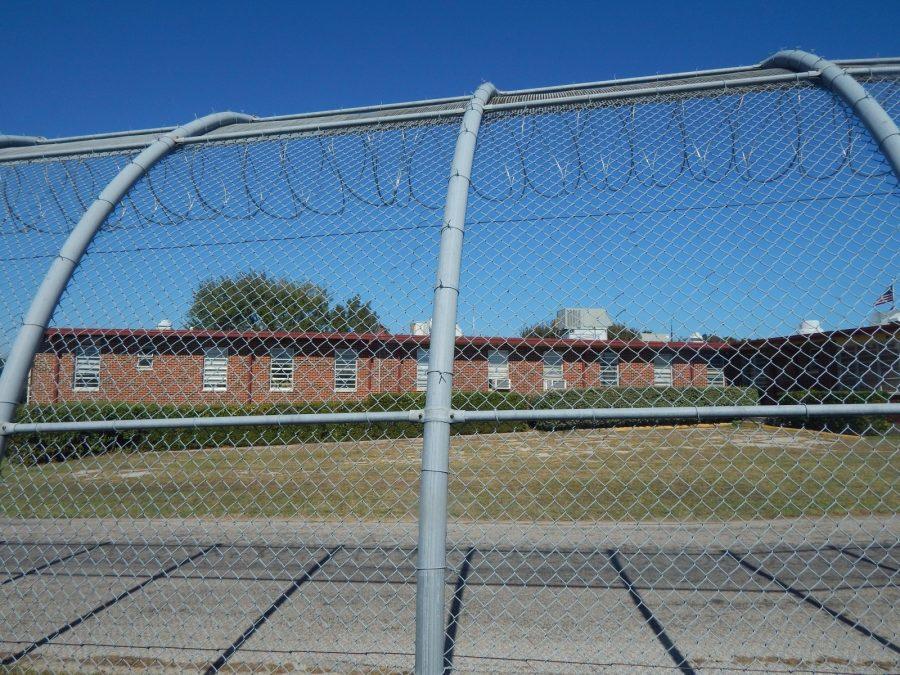Texas Wesleyan students and faculty toured Gainesville State School, a maximum security juvenile correctional facility, on Thursday.
The students were given a chance to explore inside the facility and see how social workers and correctional officers work with juvenile offenders.“It is a unique opportunity for students to go behind the wall and see the complexity of work that is the criminal justice system,” said Dr. Eddy Lynton, assistant professor of sociology and criminal justice.
The trip originally started as part of Lynton’s corrections and community supervision class and the juvenile delinquency class taught by Dr. Cary Adkinson, assistant professor of criminal justice.
But Lynton said the event ties in with many different classes and majors that would benefit from learning about the facility, which is about 75 minutes north of Fort Worth.
“These facilities are small cities and you can see pockets of every major present on the grounds,” Lynton said. “There are computer science folks, education, psychology, sociology and criminal justice, religion, and historians on the grounds. It really is a microcosm of degrees at work but on a smaller, interactive scale.”
Students are able to gain a deeper insight into what they see on crime/detective shows or that they learn in classes, Adkinson wrote in a recent e-mail.
“We hope they gain a deeper appreciation that what they see on TV or even learn in their classes might not accurately reflect the realities of the criminal and juvenile justice systems,” Adkinson wrote. “We encourage students to challenge any preconceived notions they might have through first-hand experience.”
Students were given the chance to ask the warden and correctional officers questions about the challenges they face on a daily basis, Lynton said.
“With the trip, I thought we were going to learn basically what a correctional officer does on a day-to-day basis, but I learned lot more,” junior criminal justice major Andrea Solis said. “It was eye opening to see how the inmates really see their family members and parents. It made me really want to become a correctional officer.”
Lynton and Adkinson have made the trip several times, and each year the number of interested students increases, said Lynton.
“In the past, we’ve used a van and some students drove themselves,” said Lynton. “This year, however, we secured a bus with the help of SGA as the informative tour has grown in popularity.”
For many students, the high point of the trip wasn’t being able to see the inside of a juvenile correctional facility, but rather getting to feast at Babe’s Chicken Dinner House in Sanger, Lynton said.
“This was super fun and interesting, but best of all we get Babe’s,” said freshman mass communications major Amanda Roach.
Lynton said he and Adkinson hope to continue offering the trip and see more students participate.
“We feel it is important to give students an appreciation for how the criminal justice system works in the ‘real world,’” Adkinson wrote. “Yes, what they are learning in class provides them with a basic understanding of fundamental concepts, but equally valuable is seeing first-hand how those concepts are applied in criminal justice policy and practice.”

Photo by Dr. Eddy Lynton









![Pippin, played by Hunter Heart, leads a musical number in the second act of the musical. [Photo courtesy Kris Ikejiri]](https://therambler.org/wp-content/uploads/2025/04/Pippin-Review-1200x800.jpg)
![Harriet and Warren, played by Trinity Chenault and Trent Cole, embrace in a hug [Photo courtesy Lauren Hunt]](https://therambler.org/wp-content/uploads/2025/02/lettersfromthelibrary_01-1200x800.jpg)
![Samantha Barragan celebrates following victory in a bout. [Photo courtesy Tu Pha]](https://therambler.org/wp-content/uploads/2025/05/20250504_164435000_iOS-834x1200.jpg)





![Hunter Heart (center), the play's lead, rehearses a scene alongside other student actors. [Photo courtesy Jacob Sanchez]](https://therambler.org/wp-content/uploads/2025/04/thumbnail_IMG_8412-1200x816.jpg)
![Student actors rehearse for Pippin, Theatre Wesleyan's upcoming musical. [Photo courtesy Jacob Rivera-Sanchez]](https://therambler.org/wp-content/uploads/2025/04/Pippin-Preview-1200x739.jpg)
![[Photo courtesy Brooklyn Rowe]](https://therambler.org/wp-content/uploads/2025/05/CMYK_Shaiza_4227-1080x1200.jpg)

![Lady Rams softball wraps up weekend against Nelson Lions with a victory [6 – 1]](https://therambler.org/wp-content/uploads/2025/04/Screenshot-2025-04-04-100924-1200x647.png)
















